Intimidated? Don't be. You ain't seen nothing yet. We're talking about back-end technologies next.
Back-end
By back-end technologies, I mean server-side stuff. Server configuration and server-side scripting.However, while configuration is important, one could actually scrape by without it unless you're in an environment where you have to take charge of your own server. Otherwise, this is pretty much the province of your vendor.
Just to list a few...
ASP.NET (http://www.asp.net/)
PHP (http://php.net/)
Python (https://www.python.org/)
Ruby (https://www.ruby-lang.org/en/)
Coldfusion (http://www.adobe.com/products/coldfusion-family.html)
JSP (http://www.oracle.com/technetwork/java/javaee/jsp/index.html)
Perl (https://www.perl.org/)
For a more complete list, see this link. (http://en.wikipedia.org/wiki/Scripting_language)
(Yes, I'm aware that ASP.NET is a framework and not a scripting language per se. This is for the layman, so bear with me.)
Pick one of these and get intimately familiar with it. And once you've reached a certain level of proficiency with it, pick up a second one. A third, if you're so inclined, but as a benchmark, most web developers know at least two.
What you must know
Regardless of what languages you end up learning, the following are a must. As with JavaScript, you'll need to know the following:- Data types.
- Operators.
- Number and date formatting.
- Arrays.
- Programming constructs, ie. For, While, If-Else, etc.
And these as well:
- Database connections and CRUD (Create, Read, Update, Delete) functions.
- Input sanitization.
- File handling.
- GET and POST.
- Sessions and cookies.
AJAX
If you're good with your JavaScript and have picked up at least one back-end scripting language, you'll want to combine these skills to produce a totally awesome package known as AJAX. To put it simply, with AJAX you can leverage on your JavaScript skills to interface with your back-end scripting language, to produce wonders on screen.More on AJAX (http://en.wikipedia.org/wiki/Ajax_(programming))
Good-to-haves
Again, these are optional. Companies are veering towards frameworks and IDEs, but if you haven't a decent foundation in the basics, forget about it. You don't want to be one of those developers who's totally crippled without an framework.PHP Frameworks such as CodeIgniter, Symfony, CakePHP, Zend
Python Frameworks such as Django and Pyramid.
Ruby Frameworks such as Ruby On Rails.
For a more complete list, check out this link! (http://en.wikipedia.org/wiki/Comparison_of_web_application_frameworks)
What are my career options?
With just back-end scripting? Not good. You'll forever play second-fiddle to software developers who are the "actual" programmers. And front-end web developers are simply more highly valued. The ability to make things look pretty leverages on artistic talent, which isn't something that can simply be learned. On the other hand, programming and scripting is about logic. Anyone with an average IQ and enough interest can pick it up.No one flourishes on back-end web scripting alone. Without databases and the front-end portion of web development, you're screwed.





No comments:
Post a Comment